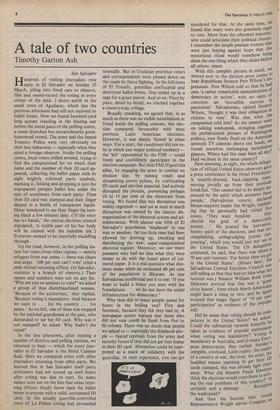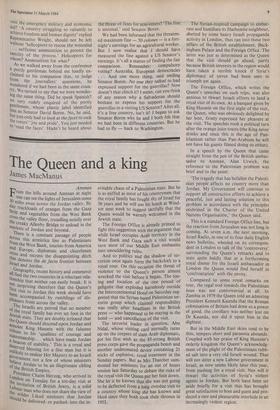A tale of two countries
Timothy Garton Ash
San Salvador
Hundreds of visiting journalists rose early in El Salvador on Sunday 25 March, piling into hired cars to observe, film and sound-record the voting in every corner of the land. I drove north to the small town of Aguilares, which late the previous afternoon had still not received its ballot boxes. Now we found hundred-yard long queues standing in the blazing sun before the metal gates of the polling centre, a sweat-drenched but extraordinarily good- humoured crowd. The army and the feared Treasury Police were very obviously on their best behaviour — especially when they spied a foreign observer. Inside the polling centre, local voters milled around, trying to find the computerised list on which their name and the number of their ID card ap- peared, collecting the ballot paper with its eight brightly coloured party symbols, marking it, folding and dropping it into the transparent perspex ballot box under the eyes of scrutineers from each party. Then their ID card was stamped and their finger dipped in a bottle of transparent liquid. Many wondered to see their finger-tip turn- ing black a few minutes later. Cif the voter has no hands,' the central elections council stipulated, 'a visible part of his/her body will be stained with the indelible ink.') Everyone seemed to be cheerfully muddling through.
Up the road, however, in the polling sta- tion for voters from other regions — mostly refugees from war zones — there was chaos and anger. '100 per cent can't vote' cried a pink-skirted returning officer. (In Salvador, statistics is a branch of rhetoric.) Their names and numbers were not on any list. 'Why are you so anxious to vote?' we asked a group of thus disenfranchised women. 'Because of the authorities,' they replied. 'Because voting is mandatory. And because we want to . . . for the country . . . for peace.' As we left, one of them was stopped by the national guardsman at the gate, who demanded to see her ID card. Why was it not stamped? he asked. Why hadn't she voted?
In the late afternoon, after touring a number of districts and polling stations, we returned to base — which for every jour- nalist in El Salvador is the Hotel Camino Real. Here we compared notes with other journalists returning from other parts. We learned that in San Salvador itself party scrutineers had not turned up until hours after voting was due to start. So many names were not on the lists that some retur- ning officers finally threw open the ballot boxes to anyone with a valid, unstamped ID card. In the usually guerrilla-controlled town of La Palma voting had proceeded normally. But in Usulutan province voters and correspondents were pinned down on the roads by fierce fighting. In the hill-town of El Triunfo, guerrillas confiscated and destroyed ballot-boxes. One ended up as a cage for a green parrot. And so on. Piece by piece, detail by detail, we stitched together a countrywide collage.
Broadly speaking, we agreed that, in as much as there was no visible intimidation or fraud inside the polling stations, this elec- tion compared favourably with most previous Latin American elections. However, it was deeply flawed in other ways. For a start, the conditions did not ex- ist in which one major political tendency — the 'left' represented by the FDE — could freely and confidently participate in the election campaign. But their FMLN guerrilla allies, by engaging the army in combat on election day, by mining roads and dynamiting power pylons, by confiscating ID cards and election material, had actively disrupted the process, preventing perhaps 10 to 15 per cent of the electorate from voting. We found that this disruption was widely regretted — and yet at least as much disruption was caused by the chaotic dis- organisation of the electoral system and ad- ministration. With almost one fifth of El Salvador's population 'displaced' in one way or another, far too little time had been allowed for drawing up, checking and distributing the new, super-computerised electoral register. Moreover, we saw many peasants who had no idea what they were meant to do with the funny piece of col- oured paper. It is a real question what elec- tions mean when an estimated 40 per cent of the population is illiterate. As one Salvadoran intellectual put it to me: `If you want to build a house you start with the foundations . . . we do not have the social infrastructure for democracy.'
Why then did so many people queue for hours in the boiling sun? First and foremost, because they felt they had to. A newspaper notice warned that those who did not vote could be fined from five to 50 colones. There was no doubt that people - we talked to — especially the displaced peo- ple — feared reprisals from the army and security forces if they did not get that stamp in their ID card. Abstention could be inter- preted as a mark of solidarity with the guerrillas. In their experience, you can get The Spectator 31 March 1984 murdered for that. At the same time, we found that many were also genuinely eager to vote. More than the educated minority, who could articulate their political choices. I remember the simple peasant women who were just hoping against hope that this mysterious ritual would somehow bring them the one thing which they desire before all others: peace. With this complex picture in mind, we moved over to the election press centre to hear Republican Senator Pete Wilson's im- pressions. Pete Wilson told us that he had seen 'a rather remarkable demonstration of democracy in action', with no signs of coercion: an 'incredible exercise in patriotism'. Salvadorans, opined Senator Wilson, 'thought it was their obligation as citizens to vote'. Was that what the campesinos told him? As the senator went on talking washspeak, stringing together the prefabricated phrases of Washington politics, eyes firmly fixed on the American network TV cameras above our heads, we found ourselves exchanging incredulous glances. Where had this man been all day? Had we,been in the same country? Next morning, at eight, the whole delega- tion of official United. States observers gave a press conference in the Hotel Presidente. A smartly-dressed, back-slapping team, moving jovially up from their poolside breakfast. 'One cannot fail to be deeply im- pressed by the spirit which animates these people,' (Salvadoran voters), declared House majority leader Jim Wright, explain- ing that he personally had visited five towns. 'They want freedom . • • theY cherish the goal of a democratic society... '. He praised the 'pervasive, festive spirit of the elections, and that un- complaining, unbegrudging joyous out" pouring', which you would just not see in the United States. The US delegation estimated, he said, that there was about a 70 per cent turnout: 'Far better than we gel in the United States'. (Hours later, the Salvadoran Central Elections Council was still telling us that they had no idea what the turnout was.) Senator William Roth froll! Delaware averred that this was a 'great' civics lesson', from which North Americans might learn a thing or two, and he agaia stressed that magic figure of '70 per cent participation' as evidence of the PoPular will. Did he mean that voting should be corn- pulsory in the United States? we asked- Could the substantial turnout honestly be taken as evidence of popular enthusia5nt. when voting was mandatory? Voting is mandatory in Australia, and in many Euro,' pean democracies, they replied. Sunday s complex, confused, Latin reality, the reality of a country at war, the tired, the poor, ti huddled huddled masses yearning to get their IVs cards stamped, this was already light Year away. What did Senator Paula Hawkins think the elections would contribute to solv- ing the real problems of this country? .1te certainly sentmessage . .
the Recogrns Id And then the bottom line: woo Representative Wright advise Congress to vote the emergency military and economic aid? 'A country struggling so valiantly to achieve freedom and human dignity' replied Repesentative Wright, should not be left Without 'helicopters to rescue the wounded
• • . sufficient ammunition to protect the sanctity of the process.' Helicopters for Whom? Ammunition for what?
As we walked away from the conference a portly gentleman behind me loudly ex- claimed to his companion that, to judge from the journalists' questions, he wondered if we had been in the same coun- try. We turned to say that we were wonder- lug the same thing. Did he speak Spanish? we very rudely enquired of the portly gentleman, whose plastic label identified hall as Senator David Boren. No, he said, but you only had to look at the faces to seek the voters"joy and pride'. You just needed to 'read the faces'. Hadn't he heard about
the threat of fines for non-voters? 'The fine is minimal,' said Senator Boren.
We had been informed that the threaten- ed maximum fine — 50 colones — is a fort- night's earnings for an agricultural worker. But I now realise that I should have measured the fine against a US Senator's earnings. It's all a matter of finding the fair comparison. Remember: compulsory voting? Australia, European democracies . . And one more thing, said smiling Senator Boren. No one they talked to had expressed support for the guerrillas? Now doesn't that clinch it? I mean, can you think of any reason why a Salvadoran should hesitate to express his support for the guerrillas to a visiting US Senator? After all, it's a free country, isn't it! I began to ask Senator Boren why he and I both felt that we had been in different countries. But he had to fly — back to Washington.















































 Previous page
Previous page